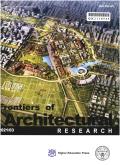A framework for rural spatial governance based on the eco-environment oriented development mode: The case of coal mining subsidence area on the Weibei Plateau
IF 3.6
1区 艺术学
0 ARCHITECTURE
引用次数: 0
Abstract
The eco-environment-oriented development (EOD) mode is an innovative project organization and implementation approach that integrates ecological governance, industrial operations, and regional development. However, this mode still requires more in-depth research to strengthen its applicability to spatial perspectives and rural patterns. This study contributes to this context by proposing a rural spatial governance framework based on the EOD mode, focusing on the three main governance elements: space, capital, and subject. By constructing a conceptual model of the multidimensional governance effectiveness of EOD systems, it reveals the coupling mechanisms of three rural elements and proposes governance modes with spatially integrated optimization, capital value circulation, and rural subject connection as the focus of elemental regulation. This mode is further demonstrated through instantiation. In response to the developmental dilemmas of the villages’ overall decline owing to coal mining subsidence on the Weibei Plateau, an integrated transformation plan for production, living, and ecological spaces is formulated, based on which the stage-specific focuses are clarified in the holistic governance path of “space-capital-subject”. The research findings exemplify the application value and feasibility in regulating element relationships and balancing multiple benefits and can provide a reference at the spatial level to promote rural sustainable development through ecological governance.
基于生态环境导向发展模式的乡村空间治理框架——以渭北高原采煤沉陷区为例
生态环境导向发展模式是一种集生态治理、产业运营、区域发展为一体的创新项目组织实施方式。但是,这一模式还需要更深入的研究,以增强其对空间视角和乡村格局的适用性。在此背景下,本研究提出了基于EOD模式的乡村空间治理框架,重点关注空间、资本和主体三个主要治理要素。通过构建EOD系统多维治理有效性的概念模型,揭示了农村三要素的耦合机制,提出了以空间整合优化、资本价值循环、农村主体联结为要素调控重点的治理模式。通过实例进一步演示该模式。针对渭北高原采煤沉陷村落整体衰落的发展困境,制定了生产、生活、生态空间一体化转型规划,在此基础上明确了“空间-资本-主体”整体治理路径的阶段性重点。研究结果体现了生态治理在调节要素关系、平衡多重利益方面的应用价值和可行性,可为通过生态治理促进农村可持续发展提供空间层面的参考。
本文章由计算机程序翻译,如有差异,请以英文原文为准。
求助全文
约1分钟内获得全文
求助全文
来源期刊

Frontiers of Architectural Research
ARCHITECTURE-
CiteScore
6.20
自引率
2.90%
发文量
430
审稿时长
30 weeks
期刊介绍:
Frontiers of Architectural Research is an international journal that publishes original research papers, review articles, and case studies to promote rapid communication and exchange among scholars, architects, and engineers. This journal introduces and reviews significant and pioneering achievements in the field of architecture research. Subject areas include the primary branches of architecture, such as architectural design and theory, architectural science and technology, urban planning, landscaping architecture, existing building renovation, and architectural heritage conservation. The journal encourages studies based on a rigorous scientific approach and state-of-the-art technology. All published papers reflect original research works and basic theories, models, computing, and design in architecture. High-quality papers addressing the social aspects of architecture are also welcome. This journal is strictly peer-reviewed and accepts only original manuscripts submitted in English.
 求助内容:
求助内容: 应助结果提醒方式:
应助结果提醒方式:


